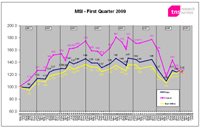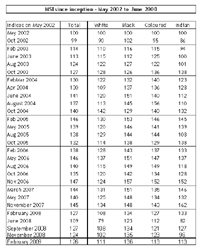TNS Research Surveys (Pty) Ltd, South Africa's leading marketing and social insights company, has released their Market Sentiment Index (MSI) results for metropolitan adults for the first quarter 2009 (the study was conducted in the middle two weeks of February).
The Index showed a small rise of two points, from 124 in November 2008 to 126 in February after a major drop to 109 in the second quarter of 2008. However, this seeming stability hides two contra-movements: the part of the Index that looks at how people are feeling about current economic conditions dropped six points (from 129 to 123) whilst the Index that looks at expectations six months hence rose from 123 to 127.
The latest rise is against a backdrop of a high but continuing slow decrease in food inflation (14.7% year on year in March compared with 15.8% in February and over 18% in the second half of last year), and after the first rise in petrol prices after five successive decreases. Prime had also dropped twice in a row since December 2008 (first by 50 basis points and then by 100 basis points in early February). Stats SA had reported the loss of over 70 000 jobs in the last quarter of 2008 and the manufacturing industry, in particular, has been hard hit by a drop in international orders.
Internationally, the global economic and financial crisis deepened amid initial hopes that the South African economy would be shielded from the worst fallout.
What fuelled this drop?
The main items fuelling the rise in people's confidence in the economy were -
- high expectations that inflation would be lower in six months' time;
- leading to an improvement in people's personal economic circumstances; and, longer term
- an improvement in business conditions and the job situation.
What prevented a greater rise were -
- perceptions that business conditions currently have become much poorer;
- that this was affecting people's current economic circumstances; and that
- the job market has already been adversely affected.
For the first time in the history of the Index, the expectations component is higher than current component. Given the release of StatsSA employment data this week that shows that 208 000 jobs were indeed lost in the first quarter of 2009, it is clear that people's expectations for an early resolution to this problem are high and are what are driving people's management of their economic lives at present.
This will clearly be one of the very major challenges of the incoming Zuma administration.
Who changed?
Whereas the Index for blacks showed no real movement, the rise was most evident for whites and, especially, Indians/Asians.
Our take-out
People's confidence in South Africa's economy grew steadily for five years, peaking in 2006 but still maintaining high levels through 2007. However, the first six months of 2008 saw all these gains wiped out - it was as if we were living in another country. From mid-2008, the drop in petrol prices, the lack of load-shedding and the static levels of interest rates allowed a partial recovery but this has now been largely offset by the perceived impact of the current global financial crisis on economic conditions in South Africa, resultant concerns around current business conditions and inflation. However, there are high expectations that people feel that this impact will not necessarily be long-lived and that inflation will improve considerably, leading to better economic and employment prospects
This puts a considerable burden on the incoming administration in the short term.
Background to the MSI
“Sentiment” is said by many to be one of the key drivers in many markets - financial, consumer, durables, the stock market and so on. TNS Research Surveys (Pty) Ltd, South Africa's leading marketing and social insights company, has developed a Market Sentiment Index (MSI) ideally suited to SA conditions (as a developing country) to provide decision-makers in all parts of the economy with some idea of people's sentiment towards the economy and, hence, their future well-being.
This index examines people's current and future perceptions of the economy in terms of job availability, business conditions, general economic conditions, prices and inflation, likely income, and the effects of AIDS and crime on the economy. These two constructs - “where are we now?” and “where are we going?” are then combined into an overall index. The future perceptions measure, in particular, can be a leading indicator of changes in people's spending patterns if it changes over time by any material amount. The index is calculated via a survey every two to three months of 2 000 metropolitan adults aged 18 years and over, sampled from the major metropolitan areas of South Africa. In the latest reading, 1 260 blacks, 385 whites, 240 coloureds and 115 Indians/Asians were questioned. The overall margin of error is less than 2.5%. The index was first measured in May/June 2002.
Technical note
People were interviewed face-to-face in their homes. The study was conducted by TNS Research Surveys (Pty) Ltd as part of their ongoing research into current social and political issues and was funded by TNS Research Surveys (Pty) Ltd. For more details, please contact Neil Higgs, Director, on (011) 778-7500 or 082-376-6312. www.tnsresearchsurveys.co.za
About TNS
TNS, who recently merged with Research International, is the world's largest custom research agency delivering actionable insights and research-based business advice to its clients so they can make more effective business decisions. TNS offers comprehensive industry knowledge within the Consumer, Technology, Finance, Automotive and Political & Social sectors, supported by a unique product offering that stretches across the entire range of marketing and business issues, specialising in product development & innovation, brand & communication, stakeholder management, retail & shopper, and qualitative research. Delivering best-in-class service across more than 70 countries, TNS is part of Kantar, the world's largest research, insight and consultancy network. Please visit www.tnsglobal.com for more information.
The Kantar Group
The Kantar Group is one of the world's largest research, insight and consultancy networks. By uniting the diverse talents of more than 20 specialist companies - including the recently-acquired TNS - the group aims to become the pre-eminent provider of compelling and actionable insights for the global business community. Its 26,500 employees work across 80 countries and across the whole spectrum of research and consultancy disciplines, enabling the group to offer clients business insights at each and every point of the consumer cycle. The group's services are employed by over half of the Fortune Top 500 companies. The Kantar Group is a wholly-owned subsidiary of WPP Group plc. For further information, please visit www.kantargrouptns.com.


































